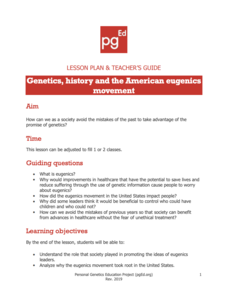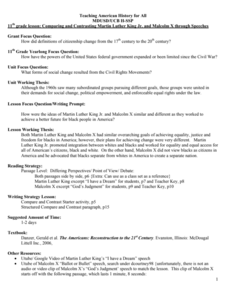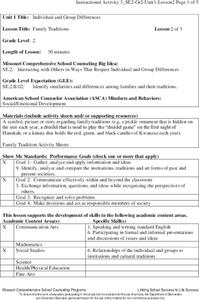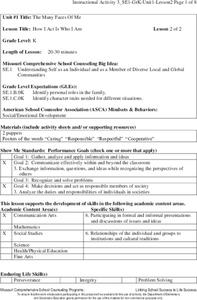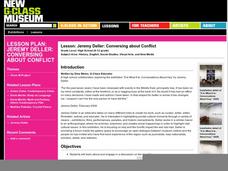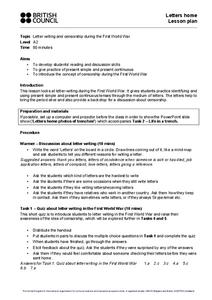Personal Genetics Education Project
Direct-to-consumer Genetic Testing
If you knew that you were likely to develop Alzheimer's disease in your future, how would it affect your life in the meantime? This and other similar thought-provoking questions are discussed in a lesson plan about the availability of...
Personal Genetics Education Project
Genetics, history and the American Eugenics Movement
A poignant 20-slide show introduces high schoolers to the amazing accomplishments of genomics and raises the question of eugenics. This lesson is only for mature audiences, as it deals with rape and other sensitive topics, but it is...
Rancocas Valley Regional High School
Teaching American History for All
Although Dr. Martin Luther King, Jr. and Malcolm X both work for equal rights, social change, and political empowerment, their approaches were radically different. To better understand these contrasts, class members compare King's "I...
Facing History and Ourselves
The Challenge of Confirmation Bias
Confirmation bias makes it difficult to overcome our preconceived notions of others. That's the big idea in a lesson that teaches learners strategies to recognize and question their biases.
PBS
“He Named Me Malala”: Understanding Student Activism Through Film
Malala Yousafzai has become the face of social activism. After watching He Named Me Malala and short student-made films about what young people can do to become instruments of change, class members reflect on what it means to be an...
Missouri Department of Elementary
Character Clovers
Build a classroom community with a lesson that uses character clovers to examine scholars' roles. Following a whole-class discussion, participants list four roles they play and accompany it with the character traits that go along with it.
Missouri Department of Elementary
What Color is Your Apple?
Build your classroom community with an activity that uses apples to examine oneself and their classmates. Participants draw four large apples on blank paper then exchange them within a small group. Group members write a character trait...
Missouri Department of Elementary
Family Traditions
Honor family traditions with a instructional activity that examines the variety of winter celebrations. Class members discuss their family's traditions then complete a cut-and-paste practice page in which they match a picture to the name...
Missouri Department of Elementary
How I Act Is Who I Am
A lesson centers itself around the topic of family roles. A whole-class discussion uses puppets and posters to go in-depth into the following character traits; caring, responsibility, respect, and cooperation. The discussion closes with...
Curated OER
Lesson: Emory Douglas: Revolution in Our Time, Part 2
I love lessons like this because they let kids see the power of art, poetry, and activism in times of social injustice and unrest. They'll analyze the art used by Emory Douglas in the production of the Black Panther newspaper and...
US National Archives
Documented Rights Educational Lesson Plan
How have groups struggled to have their unalienable rights recognized in the United States? Acting as a research team for the Human Rights Council of the United Nations, your young historians will break into groups to research how people...
Curated OER
Lesson: Tlatelolco: Mexican Student Massacre 1968
The Massacre of Tlatelolco is the focus of a discussion-based lesson. Civil-minded learners consider the nature of student movements that have ended in violence based on over-reaction and government oppression. They discuss the social...
Alabama Department of Archives and History
Extra! Extra! Read All About It?
Remember the Lusitania! As part of their study of the causes of World War I, class members examine newspaper articles and propaganda posters about the sinking of the Lusitania and then craft their own news story about the event.
Mikva Challenge
Why Vote?
Elections are supposed to represent the will of the people. So why don't 100% of registered voters line up at the polls on Election Day? High schoolers study the last few elections and the voter turnout for each, according to race,...
Curated OER
Lesson: Ayman Ramadan: Koshary min Zamman
Examine the avant-garde movement and artists who explore the ideas of the Situationist. The class view imaged of Ayman Ramadan's installation pieces, learn about modern-day Egypt, and research other artist who use art to express social...
National Endowment for the Humanities
Revolution '67, Lesson 2: What Happened in July 1967? How Do We Know?
Even in a world in which dozens of participants and curious onlookers record every controversial event, the basic facts of what happened are often in dispute. Revolution '67, Lesson 2 explores 1967 Newark, New Jersey using an examination...
National Constitution Center
Creating Your Own Town Hall Poster
Middle and high schoolers are walking into a world rife with strong political viewpoints and vocal opinions. Help to prepare them for controversial discussions with a lesson in which they choose, research, and learn more about a...
Benjamin Franklin Tercentenary
From Ben’s Pen to Our Lives
What would Ben do? Jumping off from the pseudonymous letters Ben Franklin fooled his older brother into publishing when he was still a teenager, young literary lovers dive into acting, writing, and addressing a local issue with wit and...
Curated OER
Lesson: Jeremy Deller: Conversing about Conflict
Bridge cultural awareness, community, government, and art with an introspective and thought-provoking lesson. Upper graders become globally and socially aware as they analyze and explore the art of Jeremy Deller. They consider his images...
Curated OER
Who’s Got Your Back?
You can explore art, social studies, and history all at the same time with a great lesson about the painting Rodeo-Pickup Man. The class examines several close-up images of the piece and then considers what the painting is telling them...
Peace Corps
Culture is Like an Iceberg
What influences the way you dress, or celebrate holidays, or connect with your friends? Explore the cultural traits that are not easily seen with an engaging discussion. Using the model of an iceberg, learners place features of culture...
Curated OER
Lesson: Emory Douglas: Art and Activism
Visual literacy can be experienced in many different ways. Learners discuss the times, graphic art, and cultural significance of activism in art as they explore artist and Black Panther, Emory Douglas. This is a discussion-based...
Curated OER
Simply Dazzling!
Color, shape, and pattern can be found and analyzed in almost any setting, but the context in which they are considered here will help connect art, social studies, and acculturation. Little ones check out the piece Eyedazzler Blanket to...
British Council
Letters Home
When you're writing historical fiction, the past really can become the present — especially if you're writing in the present continuous tense! Cover World War I, verb tenses, censorship, and letter writing with one informative...
Other popular searches
- Esl Social Studies Lessons
- Social Studies Lessons Rome
- Social Studies Lessons Japan
- Social Studies Lessons on Maps



